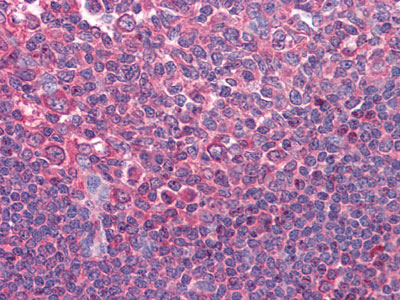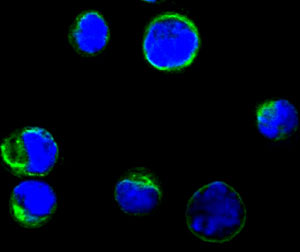CD80 Antibody
Purified Mouse Monoclonal Antibody
- SPECIFICATION
- CITATIONS
- PROTOCOLS
- BACKGROUND

Application
| IHC, ICC, E |
|---|---|
| Primary Accession | P33681 |
| Reactivity | Human |
| Host | Mouse |
| Clonality | Monoclonal |
| Clone Names | 2A2 |
| Isotype | IgG1 |
| Calculated MW | 55kDa |
| Description | The protein CD80 (Cluster of Differentiation 80) is a molecule found on activated B cells and monocytes which provides a costimulatory signal necessary for T cell activation and survival. It is also known as B7.1. Its principal mode of action is by binding to CD28. Along with CD86, these molecules provide the necessary stimuli to prime T cells against antigens presented by antigen-presenting cells. CD80 and CD86 also bind to CTLA-4, a cell surface molecule expressed on activated T cells. Interactions between CD80 or CD86 with CTLA-4 decrease the response of T cells. Mouse research by scientists at Emory University showed that estrogen-related bone loss is linked to recently discovered pathways involving various proteins, such as CD80 and other functions. In a nutshell, reactive oxygen stimulates dendritic cells, which activate other immune cells to up-regulate production of CD80, the molecule co-responsible for T cell activation."When this pathway is activated, it leads to increased T cell TNF production and ultimately to bone loss."In turn, T cells produce a protein, Tumor Necrosis Factor, which increases the formation of osteoclasts in rodents and humans. Osteoclasts cause minerals to be released from the bone, so that calcium is taken into the bloodstream to be used for other functions of the body. Osteoclast differentiation is inhibited by osteoprotegerin; Estrogen stimulates osteoprotegerin production. |
| Immunogen | Purified recombinant fragment of CD80 expressed in E. Coli. |
| Formulation | Ascitic fluid containing 0.03% sodium azide. |
| Gene ID | 941 |
|---|---|
| Other Names | T-lymphocyte activation antigen CD80, Activation B7-1 antigen, BB1, CTLA-4 counter-receptor B7.1, B7, CD80, CD80, CD28LG, CD28LG1, LAB7 |
| Dilution | IHC~~1/200 - 1/1000 IF~~1/200 - 1/1000 WB~~1:500~~2000 |
| Storage | Maintain refrigerated at 2-8°C for up to 6 months. For long term storage store at -20°C in small aliquots to prevent freeze-thaw cycles. |
| Precautions | CD80 Antibody is for research use only and not for use in diagnostic or therapeutic procedures. |
| Name | CD80 |
|---|---|
| Synonyms | CD28LG, CD28LG1, LAB7 |
| Function | Involved in the costimulatory signal essential for T- lymphocyte activation. T-cell proliferation and cytokine production is induced by the binding of CD28, binding to CTLA-4 has opposite effects and inhibits T-cell activation. |
| Cellular Location | Membrane; Single-pass type I membrane protein. |
| Tissue Location | Expressed on activated B-cells, macrophages and dendritic cells |

Thousands of laboratories across the world have published research that depended on the performance of antibodies from Abcepta to advance their research. Check out links to articles that cite our products in major peer-reviewed journals, organized by research category.
info@abcepta.com, and receive a free "I Love Antibodies" mug.
Provided below are standard protocols that you may find useful for product applications.
References
1. Transplant Proc. 2008 Oct;40(8):2729-33. 2. Nat Med. 2007 Dec;13(12):1440-9.
If you have used an Abcepta product and would like to share how it has performed, please click on the "Submit Review" button and provide the requested information. Our staff will examine and post your review and contact you if needed.
If you have any additional inquiries please email technical services at tech@abcepta.com.













 Foundational characteristics of cancer include proliferation, angiogenesis, migration, evasion of apoptosis, and cellular immortality. Find key markers for these cellular processes and antibodies to detect them.
Foundational characteristics of cancer include proliferation, angiogenesis, migration, evasion of apoptosis, and cellular immortality. Find key markers for these cellular processes and antibodies to detect them. The SUMOplot™ Analysis Program predicts and scores sumoylation sites in your protein. SUMOylation is a post-translational modification involved in various cellular processes, such as nuclear-cytosolic transport, transcriptional regulation, apoptosis, protein stability, response to stress, and progression through the cell cycle.
The SUMOplot™ Analysis Program predicts and scores sumoylation sites in your protein. SUMOylation is a post-translational modification involved in various cellular processes, such as nuclear-cytosolic transport, transcriptional regulation, apoptosis, protein stability, response to stress, and progression through the cell cycle. The Autophagy Receptor Motif Plotter predicts and scores autophagy receptor binding sites in your protein. Identifying proteins connected to this pathway is critical to understanding the role of autophagy in physiological as well as pathological processes such as development, differentiation, neurodegenerative diseases, stress, infection, and cancer.
The Autophagy Receptor Motif Plotter predicts and scores autophagy receptor binding sites in your protein. Identifying proteins connected to this pathway is critical to understanding the role of autophagy in physiological as well as pathological processes such as development, differentiation, neurodegenerative diseases, stress, infection, and cancer.




